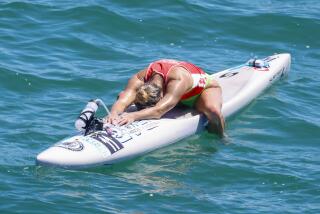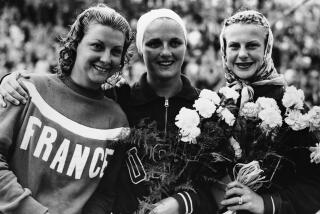Naval Pentathlete Curtis Had Leg to Stand, Win On
- Share via
SAN DIEGO — Had the chance presented itself, Mark Curtis would have welcomed having two left feet on opening day of the three-day Naval Pentathlon in Den Helder, the Netherlands.
As it was, he had to make do with a left and a right, the latter having been severely sprained two days before the five-event pentathlon began June 29.
Curtis, 28, of Bonita, not only made do, he made out like a bandit, winning the event on his fourth and final appearance.
Two days before the competition, Curtis, a petty officer first class, was taking a routine trial run on the obstacle course, his best event.
“My ankle just rolled underneath me,” Curtis said. “It was the kind of sprain that swells up immediately. I was still on crutches the first day (of competition). I thought I was out of it.”
That was the general consensus.
“I figured he was through,” said Don Rose, who has coached 23 of the 26 U.S. Naval pentathlon teams.
“Mark had an ankle sprain as bad as you’ll see. It was as big as half the size of a person’s fist. He couldn’t even walk. We had to carry him around.”
The discussion was that there would be no discussion. He would sit this one out.
“I had already written him off,” Rose said. “I didn’t want him to compete. It wasn’t worth permanently damaging himself.”
But team officials found a doctor who told Curtis the ankle wasn’t broken.
“He said it was just severely strained,” Curtis said. “The big thing, for me, was to know there were no tendons or ligaments torn. That told me one thing, that all I had to do was put up with the pain. I wouldn’t permanently damaged it. I knew I couldn’t hurt it any more.”
A short meeting took place, and Curtis was in. While he was still on the therapy table receiving treatment that included ultrasound and repeated three-minute applications of deep friction massage to increase circulation, the competition began.
“No one could believe I was going to compete,” Curtis said. “It hurt, but I kept telling myself to put up with it.”
“At the site, (Mark) said if he could do some sprints, he’d try the obstacle course,” Rose said.
Although he hadn’t practiced on three of the obstacles, Curtis did well enough for fifth after the first event.
“I knew I was in the best shape of my life,” Curtis said. “Coach and I had devised different ways to do the course to reduce the strain, but I ended up doing what I was used to.”
Along his way, “I had probably one of the smoothest runs I’ve ever had,” Curtis said.
Said Rose: “He ran that thing like a champ.”
In the second event of the day, the lifesaving swim, the foot was still inflamed. Curtis finished 19th, dropping him from fifth to eighth.
Curtis finished the seamanship race 11th, the utility swim eighth. After four events, Curtis was in fifth overall entering the final cross-country run and just hoping for a solid finish.
“The foot was pretty bad after that swim,” Rose said. “It didn’t really help him any.”
The therapy continued, and Curtis said he took several hours to warm up before taking to the course.
His sub-5-minute mile pace and close to perfect performance in the grenade-throwing segment helped him to the third-fastest time of the day, putting him first overall.
“After I was done running, I didn’t know I had won,” Curtis said. “No one knew who had.”
The U.S. team had dropped to third going into the final event, behind Sweden and Holland.
“We didn’t think we could beat Sweden,” Curtis said, “and we weren’t so sure about (catching) the Netherlands because they were on their home course.”
But Sweden had some problems throwing grenades into the target circle, and the United States finished first.
“We made up 290 points on (Sweden) in the last event, and we beat them by 60 points,” Curtis said. “All of us were ecstatic. Rose had never coached a team that came from behind to win. It was a real Cinderella story. We were still in shock that we had won, and me more so.”
Curtis said that all the training aside, the secret is simply not to flub.
“It all boils down to whoever makes the fewest mistakes,” said Curtis, who beat 62 competitors with 6,005 points, 30 ahead of second.
The last American to win this event was Clem Lisor in 1985, when the competition was held in Coronado. Curtis competed that year, finishing second in the obstacle course and third overall, and the U.S. team won.
Curtis is an instructor in training for BUD/S, the acronym for Basic Underwater Demolition/SEAL (Sea Air and Land).
He competed in his first pentathlon in 1983 in Eckernforde, West Germany. The U.S. team was second, Curtis fourth. Curtis was deployed in 1984 but came back for the event in 1985.
In the years between competitions, Curtis, a quarter-miler at heart--he was on Michigan’s third-fastest mile relay team in high school--had to work on his swimming proficiency.
“He wasn’t a very good swimmer that first year,” Rose said. “But he worked hard in the offseason, and he improved. For a person to learn swimming on that level, in that short of time . . .it’s amazing.”
In Rio de Janiero in 1986, Curtis tied for second out of 55 athletes, but the team was fifth. When the event moved to Sweden in 1987, Curtis was again overseas and said he would no longer compete.
“In 1986, I wanted to quit to pursue my Naval career, but they brought in two people to replace me in my job so I could train.”
Career goals were laid temporarily to rest, and Curtis had to tell his wife of one year, Laura, that he would compete in another pentathlon. She is in her second season on the triathlon circuit and was expecting her husband to help train her. Now, he was again training with Rose.
“I was supposed to train Laura this year. This was going to be her year,” Curtis said.
He kept his word. From April to June, Curtis worked out all day, then met Laura for laps instead of laughs.
“Training is intensive,” Curtis said. “You have to do it five times a week to stay competitive. You’d better not rest. If you have a weakness, you’d better train more.”
Said Rose: “I work with them three months, and they’re already in shape when I get them. One of our team members lost 23 pounds in one month. The pentathlon is just a different level of pain. It’s just such a grueling event, not only physically, but the technical aspect of it. Most of the guys I get only stay on the team for two years.”
For an experienced pentathlete, “three months is plenty of time to train,” Curtis said, “but not enough for the novice.”
Curtis, who has occasionally competed in triathlons, said that he would like to see some of the top triathletes give his event a try.
“I’d love to see a Mike Pigg, Scott Molina or Scott Tinley do a pentathlon. Triathlons are so much easier, there’s no comparison.”
Rose said he has seen the most gifted of athletes wilt in the Naval pentathlon. “I had a world-class soccer player who couldn’t do it. He could have had all day, and he still couldn’t have done it.”
The competition is open to all Navy and Marine personnel, but the pentathletes come almost exclusively from the special warfare community.
“I don’t want to say it’s dominated by the special warfare division, but it is,” Curtis said. “Special warfare people do so well because pentathlons are very demanding on the upper body.”
Curtis can remember only one occasion--a Navy pilot made the team in 1986--when the team wasn’t all-SEAL.
The commotion that drug testing has caused in many major competition doesn’t affect the Naval pentathlon, because the Navy has its own testing.
“Guys have been kicked out of BUD/S because of (steroids),” Curtis said.
The United States has been competing in this international event since 1962, when it was held in Greece (the first was in Italy in 1954). The Americans finished last.
“We had never seen the equipment,” Rose said.
In Den Helder in 1968, the U.S. team won the title for the first time. American teams have won it 12 times since. Sweden was won a total of 10.
Unfortunately, Rose said, the pentathlon has not gotten the attention he feels it deserves.
“The military community doesn’t play up to physical accomplishments as much as the civilian community does,” he said. “In some countries, where the military has a very high presence, it’s very played up. It’s too bad, because it’s really something to watch.”
After going out in what he calls “a blaze of glory” by winning both the individual and team titles, Curtis said he wants to put athletics in the background for a while and work on his career, which he hopes will include a bachelors degree and officer’s commission.
“After that, I’ll get back into athletics,” he said. “The modern pentathlon. It’s the only Olympic event I’ve really considered competing in. It’s kind of tucked back in my mind.”
More to Read
Go beyond the scoreboard
Get the latest on L.A.'s teams in the daily Sports Report newsletter.
You may occasionally receive promotional content from the Los Angeles Times.






